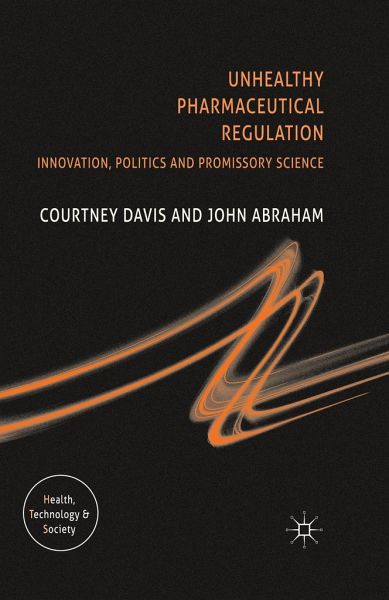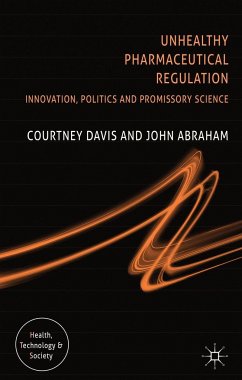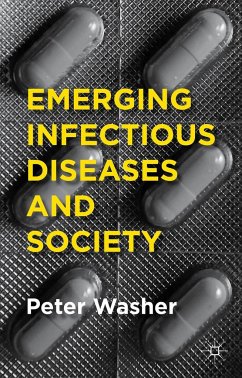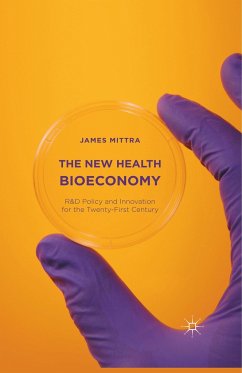
Unhealthy Pharmaceutical Regulation
Innovation, Politics and Promissory Science
Versandkostenfrei!
Versandfertig in 6-10 Tagen
Weitere Ausgaben:

PAYBACK Punkte
38 °P sammeln!





This is the first book to examine how effectively American and supranational EU governments have regulated innovative pharmaceuticals during the last 30 years regarding public health. It explains why pharmaceutical regulation has been misdirected by commercial interests and misconceived ideologies.
Courtney Davis is Senior Lecturer in Sociology at Kings College London, UK. Previously Director of the Centre for Corporate Accountability, she is author of Making Companies Safe. John Abraham is Professor of Sociology at Kings College London, UK. Author of over 100 publications on pharmaceuticals in society, he was Special Expert Adviser to the UK House of Commons Health Select Committee Inquiry into the influence of the pharmaceutical industry (2005).
Produktdetails
- Health, Technology and Society
- Verlag: Palgrave Macmillan / Palgrave Macmillan UK / Springer Palgrave Macmillan
- Artikelnr. des Verlages: 978-1-349-28417-7
- 1st ed. 2013
- Seitenzahl: 336
- Erscheinungstermin: 1. Januar 2013
- Englisch
- Abmessung: 216mm x 140mm x 19mm
- Gewicht: 424g
- ISBN-13: 9781349284177
- ISBN-10: 1349284173
- Artikelnr.: 45005840
Herstellerkennzeichnung
Springer-Verlag GmbH
Tiergartenstr. 17
69121 Heidelberg
ProductSafety@springernature.com
"Precisely 50 years have passed since the first truly modern system of medicines regulation came into operation in The Netherlands. That is a good reason to take stock of what drug regulation has achieved in half a century, and where it has perhaps failed to serve society optimally. Courtney Davis and John Abraham have now done precisely that, in a thoughtful and independent study of developments on both sides of the Atlantic. Their findings make clear the extent to which empty rhetoric from every direction (emanating most loudly from industry's puppet organizations and from neo-liberal politicians or think tanks) has been allowed to dominate the debate. This book is so solidly documented that it does not make for easy reading, but that
Mehr anzeigen
reading will be rewarded. If in the coming years society is to rethink these matters, to identify truly valid interests in the pharmaceutical field, and to strike a fair balance betweenthem, with the genuine needs of the individual consumer and patient ever in the foreground,
this is the way to do it."- Graham Dukes, External Professor of Drug Policy Studies, University of Oslo, Norway
"Davis and Abraham provide new insights into how the neo-liberal regime that has developed since the 1980s has profoundly biased the way the Food and Drug Administration and the European Medicines Agency deal with drug approvals and safety, to the detriment of the patients they are supposed to be protecting. The drug companies, not the people who need effective and safe medicines, are now the primary clients of drug regulators. However, Davis and Abraham do not stop with just criticizing the current situation; they offer concrete steps that can be taken to restore drug regulation to what should be its true function. This book should be the starting point for anyone interested in understanding the forces that are shaping the medicines we take.- Joel Lexchin, Professor of Health Policy, York University, Canada
'This extremely well-researched book serves the dual purpose of collating the decades of work carried out by Davis and Abraham and laying the foundation for a new social science discipline concerned with pharmaceuticals and public health policy. The book
outlines how a collection of theoretical tools, that is, neoliberal theory, capture theory, corporate bias theory, disease-politics theory (hard and soft versions) and expectations/marketing theory could be used by such a discipline. [...] As a consequence this book is highly relevant and recommended for anyone interested in pharmaceuticals, whether an academic, clinician, scientific or biomedical researcher, regulator or policymaker, and it may be of particular interest to patients.' - Conor M.W. Douglas, Sociology of Health and Illness
'This latest work from Davis and Abraham offers an extremely comprehensive discussion of the changes in drug regulation in Europe and the USA under neoliberalism. Through drawing on extensive fieldwork, they demonstrate how, in both these regions, the interests of the regulators and industry have become intertwined, with the former seeing the latter as partners or clients. [...] Unhealthy Pharmaceutical Regulation is essential reading for all those interested in the field of pharmaceutical regulation, and it will be of great benefit to policy-makers, regulators, scholars and students alike.' - Rachel Hendrick, Sociology 49(3)
'Unhealthy Pharmaceutical Regulation is an impressive and important book. [...] The authors build up their argument in a careful, thorough manner, with detailed attention to a range of evidence. [...] This book should be required reading not only for those interested in health, medicines, and the pharmaceutical industry, but also for those interested in neoliberal politics and policies.' - Joan Busfield, American Journal of Sociology 120(5)
this is the way to do it."- Graham Dukes, External Professor of Drug Policy Studies, University of Oslo, Norway
"Davis and Abraham provide new insights into how the neo-liberal regime that has developed since the 1980s has profoundly biased the way the Food and Drug Administration and the European Medicines Agency deal with drug approvals and safety, to the detriment of the patients they are supposed to be protecting. The drug companies, not the people who need effective and safe medicines, are now the primary clients of drug regulators. However, Davis and Abraham do not stop with just criticizing the current situation; they offer concrete steps that can be taken to restore drug regulation to what should be its true function. This book should be the starting point for anyone interested in understanding the forces that are shaping the medicines we take.- Joel Lexchin, Professor of Health Policy, York University, Canada
'This extremely well-researched book serves the dual purpose of collating the decades of work carried out by Davis and Abraham and laying the foundation for a new social science discipline concerned with pharmaceuticals and public health policy. The book
outlines how a collection of theoretical tools, that is, neoliberal theory, capture theory, corporate bias theory, disease-politics theory (hard and soft versions) and expectations/marketing theory could be used by such a discipline. [...] As a consequence this book is highly relevant and recommended for anyone interested in pharmaceuticals, whether an academic, clinician, scientific or biomedical researcher, regulator or policymaker, and it may be of particular interest to patients.' - Conor M.W. Douglas, Sociology of Health and Illness
'This latest work from Davis and Abraham offers an extremely comprehensive discussion of the changes in drug regulation in Europe and the USA under neoliberalism. Through drawing on extensive fieldwork, they demonstrate how, in both these regions, the interests of the regulators and industry have become intertwined, with the former seeing the latter as partners or clients. [...] Unhealthy Pharmaceutical Regulation is essential reading for all those interested in the field of pharmaceutical regulation, and it will be of great benefit to policy-makers, regulators, scholars and students alike.' - Rachel Hendrick, Sociology 49(3)
'Unhealthy Pharmaceutical Regulation is an impressive and important book. [...] The authors build up their argument in a careful, thorough manner, with detailed attention to a range of evidence. [...] This book should be required reading not only for those interested in health, medicines, and the pharmaceutical industry, but also for those interested in neoliberal politics and policies.' - Joan Busfield, American Journal of Sociology 120(5)
Schließen
Für dieses Produkt wurde noch keine Bewertung abgegeben. Wir würden uns sehr freuen, wenn du die erste Bewertung schreibst!
Eine Bewertung schreiben
Eine Bewertung schreiben
Andere Kunden interessierten sich für











